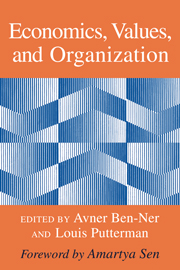Book contents
- Frontmatter
- Contents
- Foreword
- Preface
- List of contributors
- Introduction
- Part I The formation and evolution of social norms and values
- Part II The generation and transmission of values in families and communities
- Part III Social norms and culture
- Part IV The organization of work, trust, and incentives
- 13 How effective are trust- and reciprocity-based incentives?
- 14 Worker trust, system vulnerability, and the performance of work groups
- 15 Trust: beliefs and morality
- 16 Institutional commitment: values or incentives?
- Part V Markets, values, and welfare
- Epilogue
- Index
14 - Worker trust, system vulnerability, and the performance of work groups
Published online by Cambridge University Press: 05 June 2012
- Frontmatter
- Contents
- Foreword
- Preface
- List of contributors
- Introduction
- Part I The formation and evolution of social norms and values
- Part II The generation and transmission of values in families and communities
- Part III Social norms and culture
- Part IV The organization of work, trust, and incentives
- 13 How effective are trust- and reciprocity-based incentives?
- 14 Worker trust, system vulnerability, and the performance of work groups
- 15 Trust: beliefs and morality
- 16 Institutional commitment: values or incentives?
- Part V Markets, values, and welfare
- Epilogue
- Index
Summary
Introduction
Economists and social psychologists have struggled long and hard in an effort to understand the characteristics of situations in which workers will act cooperatively in the workplace instead of shirk. Like all public goods problems, the temptation to free ride on the effort of others is many times too tempting for workers, and once shirking begins, it snow-balls through the organization. But such low effort outcomes need not and do not always occur. The puzzle for us to unravel is why, in some organizations, are groups successful in selecting the high effort equilibrium while in others shirking is the commonly established norm?
It is our claim that economic systems are characterized by two properties which determine their success. One is a characteristic of the workers functioning in the system and the norms of work they have established among themselves. The other is a property of the incentive structure defined, either implicitly or explicitly, by the economic system itself. It is the match between these norms and the characteristics of the incentive program imposed on the group that is the key ingredient in determining whether an incentive system works well.
More precisely, most incentive systems define games for workers to play in which there is both strategic and stochastic uncertainty. For example, in target based group incentive systems, like profit sharing, where the group's output must equal or exceed a target before the group is able to realize the full benefits of their work, workers face the prospect of working hard only to find out that, because either others have shirked or a negative stochastic shock to output has occurred, the target has not been met.
- Type
- Chapter
- Information
- Economics, Values, and Organization , pp. 364 - 407Publisher: Cambridge University PressPrint publication year: 1998
- 11
- Cited by



